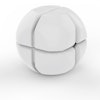Dropping the atomic bombs that essentially forced Japan to end World War II led to a number of weapons and munitions developments. Amongst them was research into the use of a kinetic energy projectile, or basically finding ways to project a really dense piece of metal at ridiculous speeds.
This would lead to damage, but without the explosive effects – similar to the Navy’s work with an electromagnetic railgun.
However, earlier iterations didn’t focus on generating the velocity. Rather, basic physics could come into play by dropping it from really high in the sky.
So, imagine a 2,000-pound tungsten rod dropped from 1,000 miles above the earth. Unlike a bullet, it would actually gain speed as it dropped, eventually hitting its target with power equivalent to an intercontinental ballistic missile, but without the mess of a nuclear weapon.
The U.S. actually used a variation of this tactic in Vietnam. These Lazy Dog bombs were small pieces of non-explosive steel fitted with fins. They were dropped by the hundreds and reached speeds of up to 500 MPH in penetrating up to nine inches of concrete.
This led to the development of Project Thor, which called for a bundle of 20’ long, 1’ thick rods dropped from high enough that they could reach sound-barrier breaking speeds, and, again avoid the fallout associated with nuclear weapons capable of delivering equivalent damage.
So why haven’t these ‘rods from God’ been released. Two main reasons.
First the actual weight of the projectile by the time it hits the target is still being debated. Just as large pieces of space junk break up and burn as they fall, the same could happen to these metal projectiles.
The other reason – cost. Dropping these hammers from the skies could be 10 times more expensive than equivalent weapons in the arsenal. However, with the commercialization of space taking new steps forward via SpaceX and others, that may not be an issue for long.






















